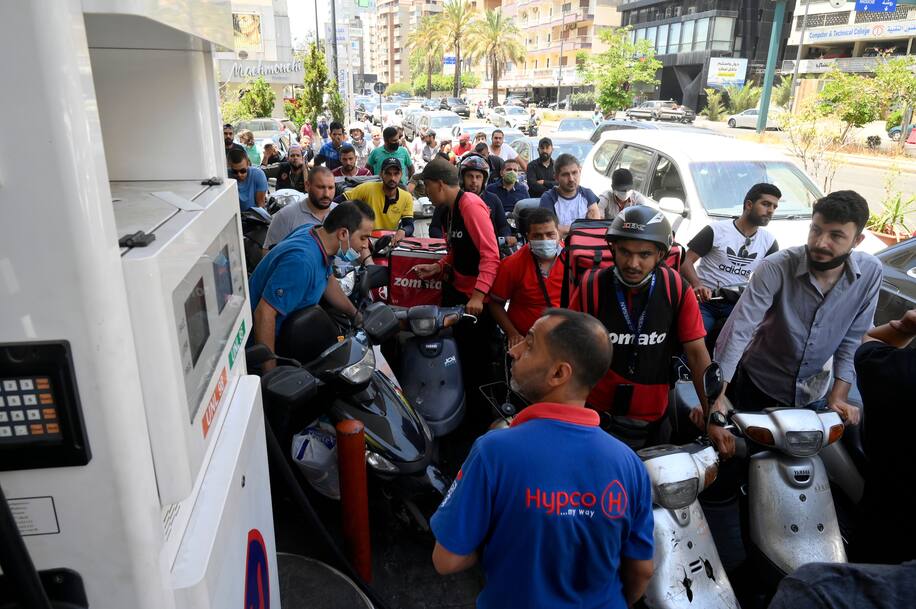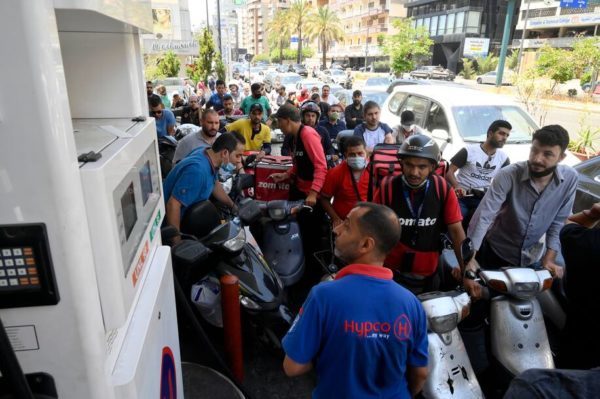
BEIRUT — In Lebanon this month, many students aren’t going to school, people aren’t working at their offices and the anti-government street protests have reignited.
This time, however, it’s not because the coronavirus, it’s about gasoline — or rather the almost total lack of it.
In a country that has become no stranger to crisis, the fuel shortage is the latest in a series of catastrophes, ranging from an economic collapse that has shrunk the currency to a tenth of its value, a pandemic that has shuttered the doors of many businesses and a blast last summer that killed over 200 people and devastated much of central Beirut.
Lines now stretch for miles at gas stations as people wait for hours to buy the small amounts of rationed fuel they are allowed at a time.
Subsidies have kept gasoline affordable in Lebanon, but the cash-strapped government can’t pay for them any more and needs to save its dwindling financial reserves as it runs out of the dollars it needs to import fuel. Scarce gasoline is also being smuggled into neighboring Syria, which is also in desperate need.
The result is long lines and hassle as people search for the few remaining gas stations with active pumps.
Lebanon is a country heavily reliant on cars and motorcycles: there is no metro system, few public buses, and no bicycle lanes. Everything can, and is, delivered to the comfort of your house: PCR tests, water jugs — even mixed cocktails.
And now, in the south of the country where the market shortage is more acute, the lines longer, and the stations offering less, you can have someone deliver a jug of gasoline to your house, though its three times the price.
Many petrol stations have decided to close, sealing themselves off with red and white tape so drivers can see they’re not serving. Many accused the owners of holding onto fuel to sell it later at a higher price, after the subsidy is reduced.
The association of gas station owners has denied such claims and blame the central bank for not supplying dollars to cover the country’s fuel import needs.
Beirut was long a city awash with luxury: nestled halfway down Lebanon’s long coastline, the capital boasts extravagant beach clubs, a yacht club, some of the world’s most renowned fashion designers, and overpriced glitzy restaurants. Residents are tired of hearing the overused but fitting cliche, “You can ski and swim in the same day in Lebanon” — a reference to the short drive between the beach and the mountains.
But that famously-short drive is no longer: highways are clogged with sometimes three columns of cars lined up at the stations outside of town waiting to fill up. Some people show up with plastic bottles and
gallons and argue for more than the allotted amount of gas per person. Most are turned away.
Every excursion now involves a complex web of planning for how to get gas, while scouting for open stations with a wait of under one hour. Some people are paying their “natour” (similar to a building doorman) to stand in line for them.
Driving outside of Beirut used to be citydwellers’ favorite pastime: now residents who can afford to, avoid getting in their car, saving their precious gas in case of an emergency. Beirut pedestrians have always complained about the relentless cabs that trail them on the streets, asking if they need a ride. Now few cabs can be seen on the roads.
Uber wait times, which in central Beirut used to be almost nonexistent, now stretch to 20-30 minutes.
Last week, an Uber driver saw the meager amount he had made taking me to my destination and almost began to cry — fares have not kept up the rising cost of living, especially with so much time spent waiting in line.
Another elderly, white-haired driver told me he went to the gas station at 5:30 a.m., because he couldn’t just sleep in his car while waiting in line like the younger drivers. After an hour’s wait he was only allowed to buy enough gas for a quarter tank.
“If we want to fill our entire tank,we have to spend the whole day in lines,” he said slowly, angrily, before announcing this was his last ride, that he was fed up, that he was going home. I watched him reject the next ride and turn off his application. I did not ask if he meant he was done driving for the day, or for good. I don’t think he knew.
Last week, men got into a fistfight over whose turn it was at a gas station before someone shot a gun in the air, dispersing the angry crowd. Another man reportedly also fired his gun outside a station in the financially-hit northern city of Tripoli after employees there turned him away because there was no fuel.
One of the gas stations that witnessed a shooting incident later put out a statement, saying incidents like these place their workers “in a very very dangerous position” and called it “a humiliating and difficult scene.” The gas station company called on the army, security forces, and municipalities to help organize and maintain security, or the station would close.
A friend of mine recently ran out of gas, pulled his car over to the side of the road and just walked away instead of trying to find a gas station. He’s not sure when he’ll go back for it.
In true Lebanese fashion, some have found a way to laugh at the crisis: a satirical “Missed Connections” Instagram page has already popped up, posting supposed screenshots of people’s messages as they try to locate a possible future loved one that they had spotted while waiting in line. “Are you stuck in the traffic besides the gas station in Lebanon and you developed a crush on anyone? Talk to us.”
WASHINGTON POST


Leave a Reply
You must be logged in to post a comment.